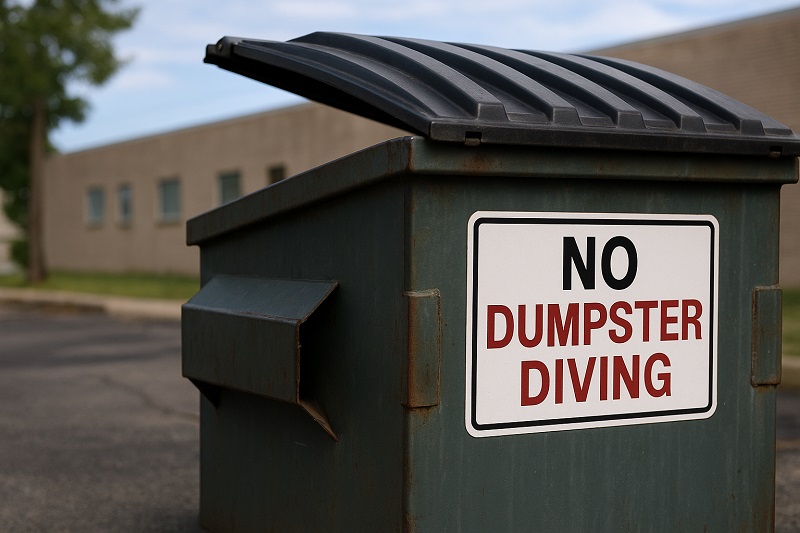Dumpster diving means looking through trash for useful items. Is dumpster diving legal? It depends on where you are. Some places allow it in public bins. Others have strict rules against trespassing or theft. Check local laws to stay safe.
What the Law Says: Public vs. Private Trash
The legality of dumpster diving hinges on one key factor: location.
- Public Property: In general, once trash is placed on the curb for collection, it’s considered abandoned. The U.S. Supreme Court ruled in California v. Greenwood (1988) that police can legally search trash without a warrant. That ruling indirectly supports dumpster diving in public spaces.
- Private Property: Things change drastically if a dumpster is on private property (e.g., behind a store, inside a fenced area). In these cases, diving could lead to trespassing or theft charges, especially if signs are posted or the dumpster is locked.
State-by-State Dumpster Diving Laws (Updated 2025)
Here’s a quick breakdown of how laws vary by state:
| State | Dumpster Diving Legal? | Key Notes |
| California | Yes | Legal on public property; many cities like LA and SF support reuse. |
| Texas | Partially | Legal unless local ordinance bans it or it involves theft/trespassing. |
| Florida | Risky | Heavily policed; many cities have strict ordinances. |
| New York | No (NYC) | NYC sanitation laws ban it; fines up to $100 possible. |
| Oregon | Yes | Generally legal; Portland actively supports waste reduction. |
| Illinois | Mixed | Depends on local ordinances; check city websites. |
| Washington | Yes | Seattle and others encourage sustainable disposal and reuse. |
| Michigan | Mixed | Detroit has no explicit bans; legality varies by city. |
| Arizona | Partially | Some cities consider it theft if the items have apparent value. |
| Massachusetts | No (urban areas) | Boston has strict sanitation rules; suburban towns may be more lenient. |
Pro Tip: Use apps like Trashwiki, Freegan.info, and iOverlander to check your city’s laws and find safe spots.
Why People Dive
People dive for free stuff like food, clothes, or gadgets. It saves money. Some want to cut waste, like environmentalists. Stores throw out good items, like bruised fruit or returned electronics. Divers find treasures others miss. The EPA says 140 million tons of trash go to U.S. landfills each year. Much of it can be used. Diving helps reduce waste and meets needs.
Risks to Watch
Laws aren’t the only worry. Dumpsters can be dangerous. Broken glass or bad food can hurt you. Wear gloves and strong shoes. Use tools like grabbers to stay safe. Privacy rules matter too. Don’t take papers with personal details, like bank records. That can cause trouble. Police often focus on trespassing, so stick to public bins to avoid problems.
Dive Safely and Legally
Know the rules to stay legal. Public bins, like those in alleys, are often fine if no signs ban diving. Private property, like store lots, can lead to trouble without permission. Ask the owner first. Dive in daylight to avoid suspicion. Wear bright clothes and carry a light to show you’re not sneaking. If police come, stay calm, explain what you’re doing, and leave if asked.
Is It Right to Dive?
Some say diving is good because it cuts waste. Others think it’s rude, especially on private land. Businesses may not like it for safety reasons, but some don’t mind if you’re quiet. A few stores even leave good items out for divers. Be respectful. Clean up, don’t make a mess, and only take what you need. This keeps diving possible.
Communities & Culture: The Rise of the Divers
Dumpster diving is no longer fringe. It’s a movement:
- Reddit’s r/DumpsterDiving has over 200,000 members sharing tips, photos, and legal insights.
- Local Dive Teams often coordinate pickups for shelters or food pantries.
- Freeganism (living off waste) is gaining traction in eco-conscious cities like Portland and Austin.
“I save about $400/month by diving behind bakeries and electronics stores,” shares Reddit user @GroceryGuerilla.
Spotlight: In Minneapolis, the “Zero Waste Divers” hold weekly meetups to exchange salvaged goods and teach safety tips.
Tips for New Divers
New to diving? Check spots first. Grocery stores and bakeries have great finds. Look after stores close but before trash pickup. Bring a friend for safety. Use a strong bag to carry items. Clean everything well before using it. Check local laws on city websites or forums. Call the police non-emergency line if you’re not sure. Take photos to track your dives, but don’t share private details online.
Helping the Environment
Diving is good for the planet. The EPA says 30% of landfill trash can be reused. Divers save food, clothes, and gadgets from landfills. This cuts harmful gases and saves resources. Some turn old items into art or sell electronics. Businesses save money with less trash. Cities like Seattle support diving to reduce waste.
Handling Problems
You might face store workers or locals. Be polite and leave if asked. Keep a copy of local laws, but it may not help. Police can be tough, citing trespassing on private land. Say you’re taking thrown-out items, not stealing, and follow orders. Ask businesses for permission or dive quietly to avoid trouble.
The Future of Diving
More people dive as costs rise and waste worries grow. Cities like Austin might make diving legal in public spots to cut landfill use. Others make stricter rules for safety. Apps help divers find pickup times, and social media shares tips. But more diving means more attention. Stay informed and respectful to keep diving alive.




